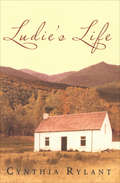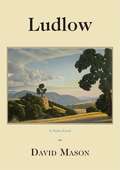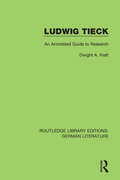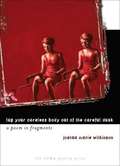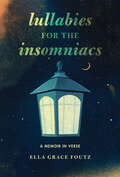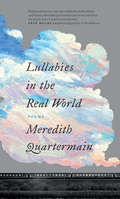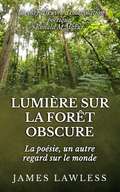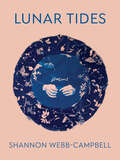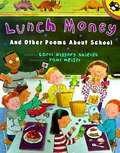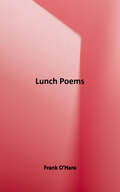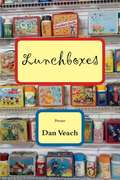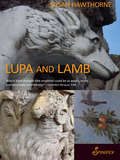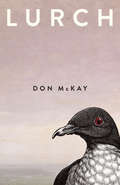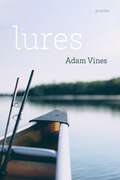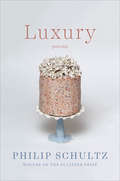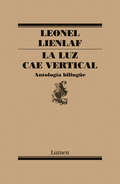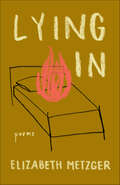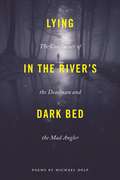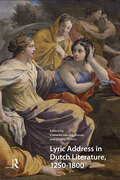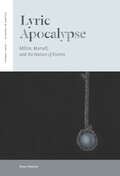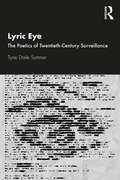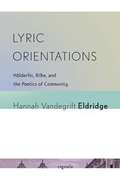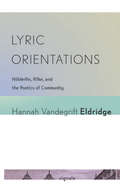- Table View
- List View
Lucretius
by E. J. KenneyThe De Rerum Natura of Lucretius is a sustained and impassioned protest against religious superstition and irrationality. The poem takes the form of a detailed exposition of Epicurean physical theory - an extreme materialism designed to remove and discredit popular fears of the gods, death and an afterlife. Book III is generally accepted to be the finest in the whole poem; Lucretius argues there that the soul is as mortal as the body and shows that human response to the fact of mortality and death can be at once rational, dignified and liberating. Professor Kenney's commentary is the first to give proper critical emphasis to the techniques and intentions of Lucretius' poetry; it can be read with profit by all students of Latin from senior school level upwards.
Ludie's Life
by Cynthia RylantCynthia Rylant returns to her home state of West Virginia with this powerful and evocative collection of poems. In a heartbreaking narrative that flows like a novel, we follow Ludie from childhood to falling in love and getting married, through the birth of her own children, and on into old age. This is the story of one woman's experiences in a hardscrabble coal-mining town, a story that brims with universal themes about life, love, and family-and all of the joy, laughter, heartache, and loss that accompany them. Would she tell you that six childrenwere too many,that some disappointed,that others surprised,but that, all in all,sixwere too manyand onewould have been just fine.Would she tell you that she marriedthat boy at fifteennot only because he was tall and kindbut also becauseshe needed a way out. -from LUDIE'S LIFE
Ludlow
by David MasonLanguage and landscape come alive in this remarkably colorful story of immigrants in southern Colorado. Among them are Greeks, Italians, Mexicans, Scots. Their struggle to survive is personal, yet they are caught up in larger events of American history in the second decade of the twentieth century, leading to the defining moment of the Ludlow Massacre in April 1914. David Mason's novel also steps back from the story, questioning whether we can know the truth about it, asking us why we want to know. Ultimately, in its charged and headlong verse, enriched by dialect and dream, Ludlow is about how we say the world, how we speak ourselves into being. Its characters, both fictional and historical figures, are intensely alive even as they are lost. Mason proves what the ancients knew—that verse remains a remarkable medium for the telling of the tale.
Ludwig Tieck: An Annotated Guide to Research
by Dwight A. KlettWhen originally published in 1993, this was the first bibliography of the secondary literature on Tieck. Given as much secondary literature surrounding Tieck’s life and works has been generated outside of his native Germany as within, this bibliography focuses particularly on his life and work from an international perspective. In order to make the information surrounding Tieck accessible, the book provides a detailed table of contents, with corresponding text divisions, rather than a subject index. It therefore highlights Tieck’s achievements in their various national contexts so that not only students of German can get an accurate feel for Tieck’s versatility and range.
Lug Your Careless Body Out of the Careful Dusk: A Poem in Fragments
by Joshua Marie WilkinsonDrawing from the paintings of Susan Rothenberg, Gwyneth Scally, and Eric Fischl as well as from the photography of Allison Maletz, Joshua Marie Wilkinson's Lug Your Careless Body Out of the Careful Dusk is a book-length poem written in small fragments. Comprised of seven sections, the poem is formed as much by the poet's travels through Turkey, the Baltics, and Eastern Europe as it is by the movies of Rainer Werner Fassbinder, Krzysztof Kieslowski, and Bill Morrison. The painters Francis Bacon and Lucian Freud are here alongside whispers of Emily Dickinson and Wallace Stevens. Lug Your Careless Body out of the Careful Dusk is a book of cinematic images and fragments, of small stories overheard and quickly abandoned, of hidden letters and phone booths, and of ghosts who return with questions. Born and raised in Seattle's Haller Lake neighborhood, Joshua Marie Wilkinson is the author of one other book of poetry, Suspension of a Secret in Abandoned Rooms, and the chapbook A Ghost as King of the Rabbits. He holds an MFA from the University of Arizona and an MA in film studies from University College Dublin. Presently he lives in Denver, Colorado, where he is pursuing his doctorate in English and creative writing and completing his first film.
Lullabies for the Insomniacs: A Memoir in Verse
by Ella Grace FoutzA teen with bipolar disorder fights for survival in Ella Grace Foutz's memoir in verse. Foutz weaves an intimate and gripping chronicle of her experience with mental illness. Amidst the turbulence of manic and depressive episodes, often accompanied by insomnia, Foutz relentlessly pursues stability and self-understanding. She examines the struggles that come with her illness, the ways it can be managed, and the ways in which it's inextricable from her deepest self—informing how she sees the world around her and within her. Balancing poignancy with moments of levity, Foutz invites the reader along for her journey as she navigates the complex terrain of mental health to forge her path forward.
Lullabies in the Real World (Crow Said Poetry)
by Meredith QuartermainMeredith Quartermain’s Lullabies in the Real World is a sequence of poems about a train journey from West Coast to East Coast that invokes a patchwork of regions, voices and histories. Her language zings with train rhythms as she unfolds a complex conversation with poets such as bpNichol and Robin Blaser.This collection reflects and refracts Canada from diverse angles, and challenges colonizing literatures such as the Odyssey and various canonical British and US voices. As it moves from west to east, the book journeys back in time to interrogate historical events such as the Battle of the Plains of Abraham and the exclusion of Acadians. It ends by imagining a time before or outside colonization.Rich, playful and confrontational, Lullabies in the Real World widens the poetic lens of poetry to investigate the place of a colonial nation in history, and the place of a poet vis-à-vis the voices of other poets.
Lullaby (with Exit Sign)
by Hadara Bar-NadavThe poems in Lullaby (with Exit Sign), explore the very nature of the elegy as rite, memorial, mechanism for healing, and raw utterance. Bar-Nadav asks, what is the shape of grief--its forms, silences, and sounds? The muscular music of her language and whip-sharp syntax join forces with startling imagery. Prose poems dominate the collection, held in place by the phantom scaffolding of lineated verse in which the poet listens for her father who "knocks on a little paper door." "This grand third book is a scrupulously crafted, brilliantly conceived sequence of poems. An essential and ravishing work." --Lynn Emanuel, judge
Lumière sur la Forêt Obscure
by James Lawless Jean-Baptiste PhilippotCette monographie est une étude de la poésie prise comme vision alternative de voir le monde et d'appréhender les réalités qui offre au lecteur une approche de cette grande altérité qui, souvent nous échappe. Le processus de créativité y est traité. Les influences d'autres disciplines sur l'exacerbation de la conscience y sont décrites et les méthodes d'observation qui ont déjà fait leurs preuves depuis les 100 dernières années y sont élucidées. Une attention particulière est portée à la contribution spécifique de la poésie irlandaise moderne en particulier, quant au rôle du poète dans la société. Les travaux de trois poètes non anglophones (Salinas, Lorca et Pasternak) sont évoqués en détail et leur rôle au sein de leur propre société y est examiné en vue de confirmer la perspicacité poétique avec laquelle ils s'opposent aux forces destructrices de la société qui risque de les mener à leur perte poètes et poésie. La dernière partie de l'ouvrage traite de la poésie comme d'une forme unique d'interprétation d'un monde post-moderne aride et fragmenté.
Lunar Tides
by Shannon Webb-CampbellExpansive and enveloping, Webb-Campbell's collection asks, "Who am I in relation to the moon?" These poems explore the primordial connections between love, grief, and water, structured within the lunar calendar. The poetics follow rhythms of the body, the tides, the moon, and long, deep familial relationships that are both personal and ancestral. Originating from Webb-Campbell's deep grief of losing her mother, Lunar Tides charts the arc to finding her again in the waves. Written from a mixed Mi'kmaq/settler perspective, this work also explores the legacies of colonialism, kinship and Indigenous resurgence.Lunar Tides is the ocean floor and a moonlit night: full of possibility and fundamental connections.Praise for Lunar Tides"In Lunar Tides, Shannon Webb-Campbell exposes a heart that's broken but also carried across the gulf between the moon and the sea, a heart that knows how "grief takes up with the body." She shows us that grief is tidal, its ebb and flow pulsing like the moon and dog-earring our memories. This book reminds us that, grieving or not, we "need to be held by something other than a theory." —Douglas Walbourne-Gough, author of Crow Gulch"Lunar Tides is both expansive and exacting, inviting us to feel our own relationship to the ocean, belonging and mortality." —Shalan Joudry, author of Walking Ground
Lunch Money: And Other Poems About School
by Carol Diggory ShieldsHere are twenty-four hilarious poems about school, where all kinds of unexpected things happen. <P><P> From an unusual pledge of allegiance and jungle gym gossip to recess rules and the rules of addition, Carol Diggory Shields captures the experiences of schoolgoers with wit and verve.
Lunch Poems: 50th Anniversary Edition
by Frank O'HaraExquisite hardcover gift edition of the groundbreaking poetry collection by the leader of the New York School of poetry, Frank O'Hara. Published on the 50th anniversary of Lunch Poems. Lunch Poems, first published in 1964 by City Lights Books as number nineteen in the Pocket Poets series, is widely considered to be Frank O'Hara's freshest and most accomplished collection of poetry. Edited by the poet in collaboration with Lawrence Ferlinghetti and Donald Allen, who had published O'Hara's poems in his monumental The New American Poetry in 1960, it contains some of the poet's best known works including "The Day Lady Died," "Ave Maria," and "Poem" [Lana Turner has collapsed!]. These are the compelling and formally inventive poems—casually composed, for example, in his office at The Museum of Modern Art, in the street at lunchtime, or on the Staten Island Ferry en route to a poetry reading—that made O'Hara a dynamic leader of the "New York School" of poets. This new limited 50th anniversary edition contains a preface by John Ashbery and an editor's note by City Lights publisher Lawrence Ferlinghetti, along with facsimile reproductions of a selection of previously unpublished correspondence between Ferlinghetti and O'Hara that shed new light on the preparation of Lunch.
Lunchboxes: Poems
by Dan VeachLunchboxes, by Dan Veach, preserves in the amber of poetry a classic 1950s Southern California childhood, complete with Superman capes, coonskin caps, cap pistols, and lunchboxes which, like this book, contain both baloney and Wonder bread. Deep background comes from the backwoods of Tennessee, where Grandpa makes a Nobel Prize discovery, and the kids get a snootfull of Aunt Ruth's snuff. Going farther back still, "A Date with Clio," the muse of history, breezes through a million years of human misadventures. Baloney is sandwiched in the "Scherzo" section--the movement Beethoven reserved for musical jokes. And finally, for those who missed out on Dan's previous book, this lunchbox contains a cool thermos of Elephant Water.
Lupa and Lamb
by Susan HawthorneThis collection of imagist poems combines mythology, archaeology, and translation. Susan Hawthorne draws on the history and prehistory of Rome and its neighbors to explore how the past is remembered. Under the guidance of Curatrix, Director of the Musæum Matricum, and Latin poet, Sulpicia, travelers Diana and Agnese are led through the mythic archives about wolves and sheep before attending an epoch-breaking party to which they are invited by Empress Livia. An enticing tapestry of real and imaginary texts that gladden the readers' hearts, Lupa and Lamb is poet Susan Hawthorne at her best.
Lurch
by Don McKay"[McKay's] exuberantly musical and shrewd poems are ecological in the fullest sense of the word: they seek to elucidate our relationships with our fragile dwelling places both on the earth and in our own skins." --New York Times Book ReviewAn extraordinary collection of poems from Griffin Poetry Prize winner Don McKay. Old joke: &“What&’s the difference between a lurch and a dance step?&” &“I don&’t know.&” &“I didn&’t think so. Let&’s sit down.&” These poems are what happens when you stay out on the dance floor instead, dancing the staggers. The full moon rises from the ocean and you lurch with astonishment that we live on a rocky sphere whirling in space. Or the bird in your hand—a pipit or a storm petrel—conveys the exquisite frailty of existence. And there&’s the complex of lurches as we contemplate our complicity in the sixth mass extinction. Throughout Lurch, language dances its ardent incompetence as a translator of &“the profane wonders of the wilderness,&” whether manifest as Balsam Fir, Catbirds, the extinct Eskimo Curlew, or the ever-present Cosmic Microwave Background. What is the difference between a love song and an elegy? We live between eroding raindrops and accelerating clocks. The piano lifts its lid to show its wire-and-hammer heart.
Lures: Poems
by Adam VinesWritten almost exclusively in traditional, modified, and nonce forms, the poems in Lures renegotiate grief, trauma, southern masculinities, and fatherhood with unflinching resolve. This new collection by Adam Vines draws much of its subject matter and imagery from fishing, revealing how close observations of species, spawning cycles, predation and feeding patterns, underwater topographies, water clarity, and lure choice reflect larger themes of what it means to be lured through memories of those who have passed and those who remain present. With Lures, Vines proposes that by reconstructing the stories from our past, we gain a greater understanding of our cultural identities and inheritances from those who made an impact on our lives.
Luxury: Poems
by Philip Schultz"Philip Schultz’s poems have long since earned their own place in American poetry. His stylistic trademarks are his great emotional directness and his intelligent haranguing—of god, the reader, and himself. He is one of the least affected of American poets, and one of the fiercest." —Tony Hoagland In this compassionate new collection, Philip Schultz’s wry and incisive poetic voice takes on both the eternal questions of meaning and happiness and essentially modern complexities—the collective power of women’s marches, the strangeness of googling oneself, the refugee crisis, the emotions associated with visiting the 9/11 memorial. At once philosophical and droll, Schultz explores life’s luxuries and challenges with masterly precision. Luxury takes its name from the center poem, which has an ironic ring next to Schultz’s Pulitzer Prize–winning collection Failure. The poem is a beautiful exploration of the pull toward life as Schultz examines the question of suicide, intimately probing a familial pull toward that darkness and weaving in the philosophy of Albert Camus and the voices and legacies of Paul Celan and Ernest Hemingway. Using humor, irony, and celebration as ballast against the book’s darker forces, Luxury explores the comfort and sustenance of life, the bittersweet clarity of aging, and the anxiety of existence. From "Greed": Happiness, I used to think, was a necessary illusion. Now I think it’s just precious moments of relief
Luz cae vertical: Antología bilingüe
by Leonel LienlafAntología bilingüe mapuzungun y castellano de una de las voces más delicadas de la poesía mapuche Con cuatro libros en treinta años, Leonel Lienlaf ha construido una obra poética admirable. Desde Se ha despertado el ave de mi corazón, su premiado primer libro, escrito a los 18 años, hasta el enigmático Epu Zuam, Lienlaf ha urdido un arte verbal que, con delicadas imágenes y evocaciones, proyecta algunos rasgos esenciales de la cultura mapuche, como la incidencia clave de los sueños en las decisiones vitales, las luchas históricas o el protagonismo shakesperiano del paisaje y la naturaleza en el destino humano. Esta antología incluye una selección de sus cuatro libros publicados, así como una quincena de poemas inéditos o dispersos.
Lying In: Poems
by Elizabeth MetzgerA devastating, vulnerable collection tracing high-risk pregnancy and new motherhood amid grief.“All my life all I’ve wanted was to be myself / and someone else,” writes Elizabeth Metzger. From the shadowy perspective of confinement, where the presence of death unsettles all outcomes, these poems examine an expansion and fracturing of the self—into motherhood as well as childhood, into past selves and future unknowns. The child becomes parent, the parent becomes child, the child arrives but in doing so is lost. New loss haunts new life, and life becomes “one or two lives.” The door is more valuable than the prize behind it.With ambivalence as well as deep feeling, Metzger wonders how a single body can be expected to hold both immense joy and immense mourning, profound longing and creeping numbness, when one so often overtakes the other. She plunges into the darkness inside—of the gloomy room, the inner body, the afterlife and the pre-language mind—and sends back “a searchlight across the underworld,” Eurydice in search of herself.Aching and contemplative, Lying In is an exquisite portrait of an in-between time—and of the person who emerges on the other side. “Isn’t it obvious how we’ve changed?”
Lying in the River's Dark Bed: The Confluence of the Deadman and the Mad Angler (Made in Michigan Writers Series)
by Michael DelpLying in the River's Dark Bed: The Confluence of the Deadman and the Mad Angler by Michael Delp is a collection of fifty-six poems that brings together two characters Delp has been perfecting for years: Deadman and the Mad Angler. The Deadman, a spirit that constantly shifts, is one part troublemaker, one part truth-teller, and one part demon who demands respect. The Mad Angler, on the other hand, could be called the Mad Shaman or Mad Activist, as he speaks of the water and nature and then of the greed of man. While these two personas are distinct in the collection (highlighted beautifully in the unique double-sided book design) they also come together at times in perfect harmony. The Deadman and the Mad Angler are walking contradictions--twin sons of different mothers. The Deadman is a trickster figure, a hive of contradictions. He can be killed but cannot die. He is supremely intelligent, yet is as dumb as a stone. He is an enigma to himself and to all others, yet he understands the origins and the meanings of the inner lives of all things. He is impossible to understand, yet somehow through his musings enlightenment occurs. His poems inspire contentedness, even though they might frighten you first in order to do so. The Mad Angler is more finely tuned, focused primarily on the environment. He exercises more restraint and resistance than his scattered brother, focusing on nature and on what is flowing in the water around him and inside of him. His voice is sure and firm on all things water related because he is as much river as person. The collection embraces these voices as separate and unique identities, while highlighting a center section called "Confluence," the place where these two come together to meditate on some of the most profound emotions evoked by the contemporary world. Lying in the River's Dark Bed reflects the compatibilities and contradictions of the natural world. These ritualized poems are both funny and thought provoking and an example of persona writing at its best. Those interested in conversational poetry and environmental writing will be enthralled with this stirring yet soothing collection.
Lyric Address in Dutch Literature, 1250-1800
by Cornelis van der Haven Jürgen PietersLyric Address in Dutch Literature, 1250-1800 provides accessible and comprehensive readings of ten Dutch lyrical poems, discussing each poem's historical context, revealing its political or ideological framing, religious elements, or the self-representational interests of the poet. The book focuses on how the use of the speaker's I creates distance or proximity to the social context of the time. Close, detailed analysis of rhetorical techniques, such as the use of the apostrophe, illuminates the ways in which poetry reveals tensions in society.
Lyric Apocalypse: Milton, Marvell, and the Nature of Events (Verbal Arts: Studies in Poetics)
by Ryan NetzleyWhat’s new about the apocalypse? Revelation does not allow us to look back after the end and enumerate pivotal turning points. It happens in an immediate encounter with the transformatively new.John Milton’s and Andrew Marvell’s lyrics attempt to render the experience of such an apocalyptic change in the present. In this respect they take seriously the Reformation’s insistence that eschatology is a historical phenomenon. Yet these poets are also reacting to the Regicide, and, as a result, their works explore very modern questions about the nature of events, what it means for a significant historical occasion to happen.Lyric Apocalypse argues that Milton’s and Marvell’s lyrics challenge any retrospective understanding of events, including one built on a theory of revolution. Instead, these poems show that there is no “after” to the apocalypse, that if we are going to talk about change, we should do so in the present, when there is still time to do something about it. For both of these poets, lyric becomes a way to imagine an apocalyptic event that would be both hopeful and new.
Lyric Eye: The Poetics of Twentieth-Century Surveillance
by Tyne Daile SumnerLyric Eye: The Poetics of Twentieth-Century Surveillance presents the first detailed study of the relationship between poetry and surveillance. It critically examines the close connection between American lyric poetry and a burgeoning U.S. state surveillance apparatus from 1920 to the 1960s. The book explores the myriad ways that poets—Ezra Pound, William Carlos Williams, W.H. Auden, Langston Hughes, James Baldwin, Sylvia Plath, Gertrude Stein, Robert Lowell, Allen Ginsberg and others—explored a developing and fraught environment in which the growing power of American investigative agencies, such as the FBI under J. Edgar Hoover, imposed new pressures on cultural discourse and personal identity. In analysing twentieth-century American poetry and its various ideas about "the self," Lyric Eye demonstrates the extent to which poetry and surveillance employ similar styles of information gathering such as observation, overhearing, imitation, abstraction, repurposing of language, subversion, fragmentation and symbolism. Ground-breaking and prescient, this book will be of great interest to scholars and researchers of literature, politics, surveillance and intelligence studies, and digital humanities.
Lyric Orientations: Hölderlin, Rilke, and the Poetics of Community
by Hannah Vandegrifte EldridgeIn Lyric Orientations, Hannah Vandegrift Eldridge explores the power of lyric poetry to stir the social and emotional lives of human beings in the face of the ineffable nature of our mortality. She focuses on two German-speaking masters of lyric prose and poetry: Friedrich Holderlin (1770 1843) and Rainer Maria Rilke (1875 1926). While Holderlin and Rilke are stylistically very different, each believes in the power of poetic language to orient us as social beings in contexts that otherwise can be alienating. They likewise share the conviction that such alienation cannot be overcome once and for all in any universal event. Both argue that to deny the uncertainty created by the absence of any such event (or to deny the alienation itself) is likewise to deny the particularly human condition of uncertainty and mortality. By drawing on the work of Stanley Cavell, who explores how language in all its formal aspects actually enables us to engage meaningfully with the world, Eldridge challenges poststructuralist scholarship, which stresses the limitations even the failure of language in the face of reality. Eldridge provides detailed readings of Holderlin and Rilke and positions them in a broader narrative of modernity that helps make sense of their difficult and occasionally contradictory self-characterizations. Her account of the orienting and engaging capabilities of language reconciles the extraordinarily ambitious claims that Holderlin and Rilke make for poetry that it can create political communities, that it can change how humans relate to death, and that it can unite the sensual and intellectual components of human subjectivity and the often difficult, fragmented, or hermetic nature of their individual poems.
Lyric Orientations: Hölderlin, Rilke, and the Poetics of Community
by Hannah Vandegrifte EldridgeIn Lyric Orientations, Hannah Vandegrift Eldridge explores the power of lyric poetry to stir the social and emotional lives of human beings in the face of the ineffable nature of our mortality. She focuses on two German-speaking masters of lyric prose and poetry: Friedrich Hölderlin (1770-1843) and Rainer Maria Rilke (1875-1926). While Hölderlin and Rilke are stylistically very different, each believes in the power of poetic language to orient us as social beings in contexts that otherwise can be alienating. They likewise share the conviction that such alienation cannot be overcome once and for all in any universal event. Both argue that to deny the uncertainty created by the absence of any such event (or to deny the alienation itself) is likewise to deny the particularly human condition of uncertainty and mortality. By drawing on the work of Stanley Cavell, who explores how language in all its formal aspects actually enables us to engage meaningfully with the world, Eldridge challenges poststructuralist scholarship, which stresses the limitations--even the failure--of language in the face of reality. Eldridge provides detailed readings of Hölderlin and Rilke and positions them in a broader narrative of modernity that helps make sense of their difficult and occasionally contradictory self-characterizations. Her account of the orienting and engaging capabilities of language reconciles the extraordinarily ambitious claims that Hölderlin and Rilke make for poetry--that it can create political communities, that it can change how humans relate to death, and that it can unite the sensual and intellectual components of human subjectivity--and the often difficult, fragmented, or hermetic nature of their individual poems.

